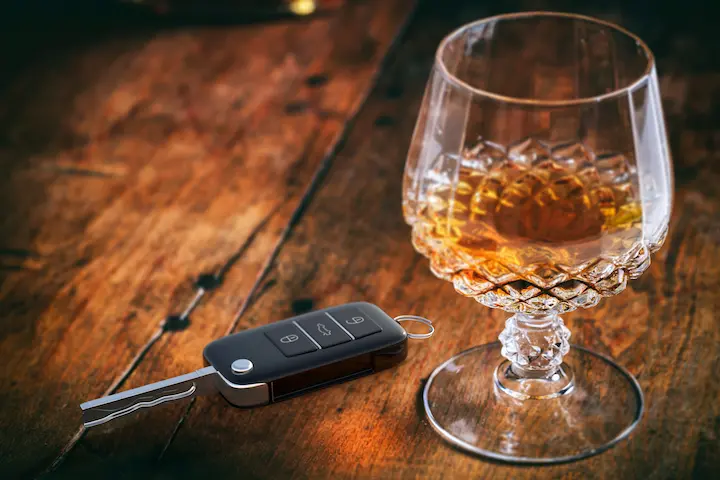If you find yourself facing charges of driving while impaired (DWI) in the state of North Carolina, you’ve come to the right place. Our team of Raleigh DWI attorneys is dedicated to providing you with the knowledge and guidance you need to navigate the complex legal landscape surrounding DWI offenses.
At the Coolidge Law Firm, we firmly believe that every individual deserves a fair and vigorous legal defense, regardless of the circumstances. For that reason, we are aiming to empower individuals charged with a DWI with the knowledge necessary to protect their rights, navigate the legal process, and achieve the best possible outcome for their cases.
What is DWI in North Carolina?
DWI is a serious offense in North Carolina, with stringent laws in place to deter impaired driving and protect public safety. Understanding the basics of DWI in North Carolina is crucial for anyone facing criminal charges or seeking to broaden their knowledge of the state’s legal landscape.
BAC Levels in NC DWI Cases
In North Carolina, it is illegal to operate a motor vehicle while under the influence of alcohol, drugs, or any impairing substance that affects one’s physical or mental faculties. The legal limit for blood alcohol concentration (BAC) is 0.08% for drivers aged 21 and above, while a BAC of 0.04% is considered the legal limit for commercial drivers. For drivers under the age of 21, a BAC of 0.00% is required to avoid a DWI charge.
How Does Law Enforcement Assess BAC?
Law enforcement officers in North Carolina use various methods to detect impaired drivers. These include field sobriety tests, breath tests using a breathalyzer device, and blood or urine tests. It’s important to note that under the state’s implied consent law, drivers who refuse to submit to chemical tests may face additional penalties, such as a one-year driver’s license suspension.

Understanding DWI Conviction
DWI conviction refers to the legal finding of guilt for operating a motor vehicle while under the influence of alcohol, drugs, or any impairing substance that affects one’s ability to drive safely. In North Carolina, a DWI conviction carries serious consequences that can impact various aspects of an individual’s life.
Definition and Elements of DWI Conviction
To secure a DWI conviction in North Carolina, the prosecution must establish certain elements beyond a reasonable doubt.
These elements typically include:
- Impairment: The prosecution must prove that the driver’s physical or mental faculties were appreciably impaired by alcohol, drugs, or impairing substances while operating the motor vehicle.
- Operation of a Vehicle: The prosecution must demonstrate that the accused person was in actual physical control of a motor vehicle on a public highway or vehicular area.
The Aggravating and Mitigating Factors Considered in DWI Conviction
In North Carolina, DWI convictions can be influenced by aggravating and mitigating factors, which can impact the severity of penalties.
Aggravating factors include:
- Grossly Aggravating Factors: These are circumstances that significantly increase the seriousness of the offense, such as prior DWI convictions within the past seven years, driving with a revoked license, or causing serious injury or death.
- Aggravating Factors: These factors include a high BAC level (0.15% or higher), reckless driving, speeding, driving with a child passenger, or attempting to elude law enforcement.
On the other hand, mitigating factors may help lessen the severity of penalties and can include things like a low BAC level, safe driving record, voluntary submission to alcohol assessment, completion of substance abuse treatment, or proof of a responsible attitude post-arrest.
Prior DWI Convictions and Their Effects
Prior DWI convictions can have a significant impact on the penalties imposed for subsequent offenses. North Carolina employs a “look-back period” of seven years, meaning prior DWI convictions within the past seven years will be considered for sentencing purposes. Multiple DWI convictions within this period can result in increased fines, longer license suspensions, mandatory jail time, and the possibility of a felony charge.

Consequences of a DWI Conviction
The consequences of a DWI conviction in North Carolina can have a significant impact on multiple aspects of a person’s life. Let’s take a closer look at the various penalties associated with DWI in NC.
Fines and Penalties
DWI convictions often result in substantial fines. The amount of the fine can vary depending on factors such as prior convictions, BAC level, and aggravating circumstances. Repeat offenders and those with higher BAC levels generally face more severe fines.
License Suspension
A DWI conviction in North Carolina typically leads to a driver’s license suspension. The duration of the suspension depends on factors such as prior convictions and BAC level. For example, a first-time offender may face a license suspension ranging from one year to four years, while subsequent offenses can result in longer or even permanent revocations.
Ignition Interlock Device
In North Carolina, certain DWI offenders may be required to install an ignition interlock device (IID) in their vehicles. This device measures the driver’s BAC and prevents the vehicle from starting if alcohol is detected. The duration of IID installation varies based on the specific circumstances of the case.
Insurance Rates
Insurance companies generally consider DWI convictions as high-risk behavior, resulting in increased premiums or even the cancellation of insurance policies. It may take several years for insurance rates to return to normal, even after a DWI conviction is no longer on the driving record.
Criminal Record
A criminal record can affect employment prospects, housing applications, and professional licenses, and may even impact personal relationships. Expungement options for a DWI conviction in North Carolina are limited, so it’s crucial to seek legal advice to understand the potential long-term effects.
Community Service
DWI convictions often include a requirement to complete community service. The number of community service hours can vary based on the circumstances of the case and may be imposed in addition to other penalties.
North Carolina DWI Administrative Penalties
In North Carolina, a DWI conviction triggers not only criminal penalties but also administrative penalties that affect driving privileges. These administrative penalties are imposed by the North Carolina Division of Motor Vehicles (DMV) and can have immediate effects.
Immediate License Suspension
Upon arrest for DWI, the arresting officer may confiscate the driver’s license and issue a 10-day temporary driving permit. Following this, the DMV imposes an immediate license suspension. The length of the suspension varies based on factors such as prior DWI convictions and breathalyzer test refusal history.
Limited Driving Privileges
North Carolina law provides an option for individuals whose licenses are suspended due to a DWI conviction to obtain limited driving privileges. These privileges allow driving for specific purposes, such as work, school, or medical appointments. However, to qualify for limited driving privileges, individuals must meet certain requirements, which may include completing an alcohol assessment, obtaining appropriate insurance coverage, and adhering to any other conditions set by the court.
If you are facing a potential DWI conviction it is advisable to consult with an experienced DWI attorney, like our team at the Coolidge Law Firm in Raleigh, who can guide you through the legal process, explain the administrative penalties specific to your case, and help you navigate the complexities of both the administrative and criminal aspects of your DWI case.
North Carolina DWI Criminal Penalties
An NC DWI charge can result in significant criminal penalties that go beyond administrative penalties. Criminal penalties are determined by the court and can have long-lasting consequences.
Determining Factors for Sentencing
Several factors are considered when determining the criminal penalties for a DWI conviction in North Carolina. These factors may include the driver’s prior DWI convictions, the level of impairment (BAC level), the presence of aggravating factors such as reckless driving or causing injury, and any mitigating factors. The court takes these factors into account to determine the appropriate level of punishment.
Possible Jail Time
Jail sentences are a potential consequence of a DWI conviction in North Carolina. The length of incarceration varies depending on the specific circumstances of the case. For a first-time DWI offense, the potential jail time can range from 24 hours to a maximum of 24 months. Subsequent DWI offenses or aggravating circumstances can result in longer jail sentences, with mandatory minimums imposed in certain situations.
Long-Term Consequences
A DWI conviction in North Carolina can have long-term consequences beyond the immediate penalties.
Impact on Employment
Some employers may have policies against hiring individuals with certain criminal convictions, including DWI offenses. It’s important to be aware that a DWI conviction can significantly affect current employment as well as future job opportunities.
Impact on Professional Licenses
A DWI conviction can have implications for these licenses and may result in disciplinary actions or even revocation. It’s essential to consult with an attorney familiar with professional licensing matters to understand the potential impact on your specific profession.
Impact on Immigration Status
Depending on the circumstances and the specific immigration status involved, a DWI conviction can result in deportation, denial of naturalization, or other immigration-related challenges. If you have concerns regarding your immigration status and a DWI conviction, it’s crucial to seek advice from an NC immigration attorney who can provide guidance specific to your situation.
What to Do If Charged with DWI in North Carolina
Being charged with a DWI in North Carolina can be a stressful and overwhelming experience. It’s important to take immediate steps to protect your rights and build a strong defense.
Contact an Experienced DWI Attorney
Seek legal representation from a skilled DWI attorney specializing in North Carolina DWI laws. An experienced attorney can provide guidance, navigate the legal process, and advocate for your rights.
Understand Your Rights
Educate yourself about your rights under North Carolina law.
This includes:
- Your right to remain silent and not incriminate yourself,
- Your right to legal counsel,
- Your right to challenge the evidence against you.
Gather Evidence for Your Defense
Work closely with your attorney to gather evidence that can support your defense. This may include obtaining police reports, witness statements, surveillance footage, and any other relevant documentation. Your attorney can help identify the most pertinent evidence to challenge the prosecution’s case and build a strong defense on your behalf.
Explore Possible Defense Strategies
Collaborate with your attorney to explore potential defense strategies based on the specific circumstances of your case. This could include challenging the legality of the traffic stop, questioning the accuracy of field sobriety tests or chemical tests, disputing the reliability of the evidence, or raising any other relevant defenses.
Comply with Legal Requirements
Ensure that you meet all legal requirements and deadlines imposed by the court or the DMV. This may include attending scheduled court appearances, completing alcohol assessment programs, or complying with any probation conditions. Failing to meet these obligations can result in additional penalties or complications.
DWI Frequently Asked Questions
Do you lose your license for a DWI in NC?
Yes, if you are convicted of a DWI in North Carolina, you will face a driver’s license suspension. The duration of the suspension depends on various factors, including prior DWI convictions and the specific circumstances of the case.
How long does a DUI last in NC?
The duration of a DUI/DWI case depends on various factors, including court schedules, the complexity of the case, and potential negotiations or trial proceedings. The overall duration can vary significantly, but DWI cases generally span several months to a year or more, depending on the circumstances.
What is the penalty for a first-time DUI in NC?
A first-time DWI offense in North Carolina can result in various penalties, including fines, probation, completion of a substance abuse assessment program, mandatory alcohol education programs, and the possibility of jail time.
What is the lowest level DUI in NC?
The lowest level of DWI offense is referred to as Level 5. This generally involves a BAC level between 0.08% and 0.09% and no aggravating factors.
Is a DWI a felony or misdemeanor in NC?
In North Carolina, a DWI is typically considered a misdemeanor offense. However, certain circumstances can elevate a DWI to a felony offense, such as prior DWI convictions within a certain timeframe (habitual DWI) or cases involving serious injury or death (felony death by vehicle). Felony DWI offenses carry more severe penalties, including potentially longer periods of incarceration.
Is there a difference between DUI and DWI in North Carolina?
In North Carolina, DUI and DWI are often used interchangeably to refer to impaired driving offenses. Legally, North Carolina statutes refer to impaired driving as DWI.
Don’t Navigate the North Carolina DWI Laws Alone. Contact the Trusted DWI Lawyers at The Coolidge Law Firm Today
Are you facing the daunting challenge of a DWI charge in North Carolina? Don’t face it alone. The intricacies of North Carolina’s DWI laws require the guidance of experienced legal professionals. That’s where The Coolidge Law Firm comes in. With a proven track record and a team of trusted DWI lawyers, we are dedicated to providing you with the skilled representation you need during this challenging time.
Contact our team today by calling us at (919) 239-8448 or filling out the contact form below.



